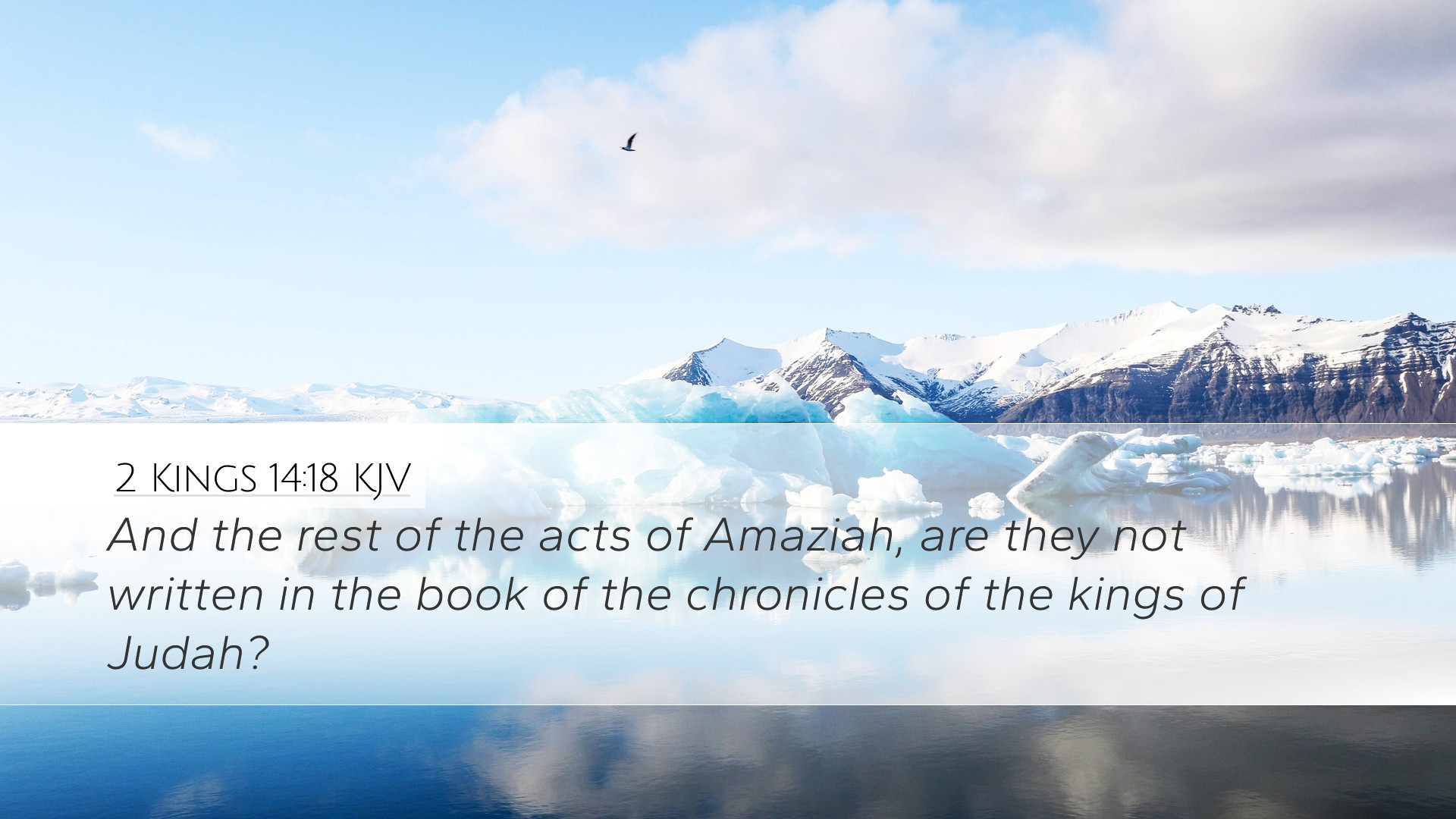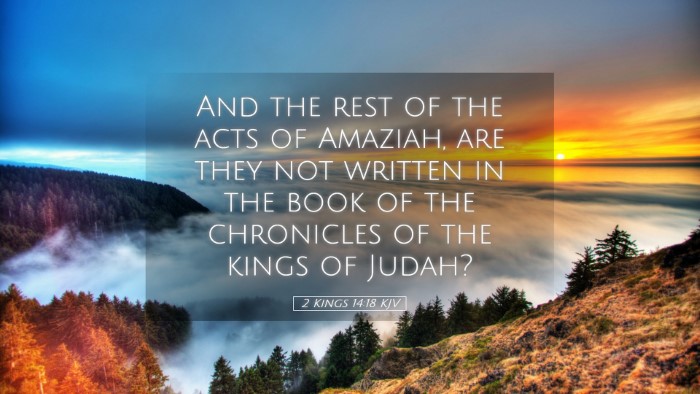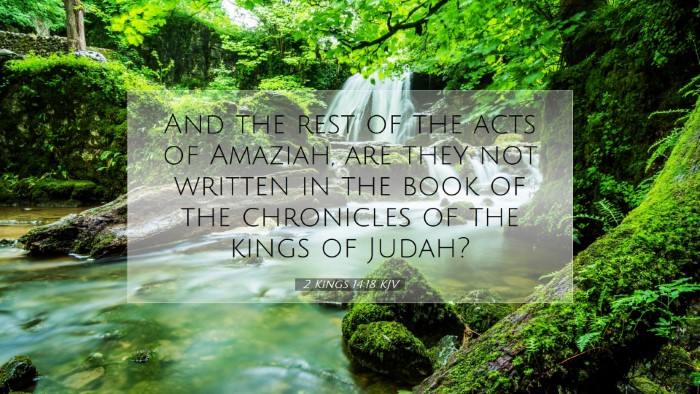Commentary on 2 Kings 14:18
Verse Text: "Now the rest of the acts of Jeroboam, and all that he did, and his might, how he warred, and how he recovered Damascus, and Hamath, which belonged to Judah, are they not written in the book of the chronicles of the kings of Israel?"
Introduction
This verse serves as a closing remark concerning the reign of Jeroboam II, summarizing his accomplishments and inviting the reader to explore further details in the annals of the kings of Israel. It emphasizes both the remarkable military successes that Jeroboam attained and the historical context in which he operated. By examining the public domain commentaries of respected theologians such as Matthew Henry, Albert Barnes, and Adam Clarke, we can gain deeper insights into this significant historical and spiritual narrative.
The Context of Jeroboam’s Reign
Theism of the period surrounding Jeroboam II is critical to understanding his legacy. Despite the economic prosperity and military expansion he brought to Israel, it is essential to recognize the moral failures that underpinned his reign.
- Military Accomplishments: Jeroboam II succeeded in recovering territories that had been under the control of Judah, namely Damascus and Hamath. Matthew Henry notes that this accomplishment reinforced the political and military power of Israel during his rule.
- Spiritual Decline: Despite these successes, Albert Barnes points out that Jeroboam failed to restore true worship of Yahweh, continuing in the idolatrous practices established by his namesake, Jeroboam I. This spiritual neglect is a recurrent theme in the history of Israel’s kings.
Analysis of Jeroboam’s Actions
Jeroboam's actions were significant in shaping the political landscape of Israel, but they came at a great cost, spiritually. Adam Clarke emphasizes that the military efforts of Jeroboam II were aimed more at consolidating power than ensuring adherence to divine commands.
- War Strategies: Clarke notes that Jeroboam used strategic warfare to reclaim lost territories, showcasing his military ingenuity and ability to navigate the complex political landscape of his time.
- Diplomatic Relations: The conquests of Damascus and Hamath were not simply territorial; they had implications for trade, alliances, and even the economy of Israel. Barnes suggests that Jeroboam's ability to exert influence over neighboring kingdoms solidified Israel's standing in the region.
Historical Records
The mention of the "book of the chronicles of the kings of Israel" indicates that there were official records that documented the reigns of the kings, which were critical for historians and theologians alike. In understanding 2 Kings 14:18, we gain insight into the importance of these historical accounts.
- Preservation of History: Matthew Henry elaborates on the significance of these chronicles in preserving national identity and communal memory, serving as a resource for future generations.
- Verification of Biblical Record: Albert Barnes remarks that these writings were essential for validating biblical history against secular accounts, offering a divine perspective on natural events.
- Lessons from History: Adam Clarke suggests that studying these records invites reflection on the moral decay that often follows national prosperity, prompting both leaders and followers to consider their spiritual priorities.
Theological Implications
While Jeroboam II's reign may illustrate success from a military standpoint, it serves as a cautionary tale regarding the relationship between worldly achievements and spiritual faithfulness. Each commentator provides unique insights framing the theological implications of his reign.
- God’s Sovereignty: All commentators highlight that despite Jeroboam’s accomplishments, God remained sovereign and his purposes would ultimately prevail. The tension between divine oversight and human agency is crucial to understanding the text.
- The Danger of Idolatry: Jeroboam’s idolatrous practices underline the theme that prosperity may lead to complacency and spiritual neglect. As Barnes warns, leaders must remain vigilant against the allure of prosperity that can corrupt their relationship with God.
- Legacy and Reflection: The verse invites reflection on legacy, both in terms of national accomplishments and spiritual faithfulness. Henry notes that the decisions of a leader echo through generations—influencing both the present and future spiritual state of a nation.
Conclusion
2 Kings 14:18 serves as an essential reminder of the complex interplay between leadership, historical legacy, and spiritual fidelity. The insights garnered from the commentaries reflect a holistic understanding of Jeroboam II’s reign, shedding light on both the external triumphs and internal failures of his leadership.
- Call to Action: For pastors, students, and scholars, this exposition serves as an invitation to consider the deeper implications of leadership—how decisions rooted in ambition must be weighed against God’s commandments and vision.
- Invitation for Reflection: Reflect upon what it means to lead not only in the secular realm but also within spiritual communities, advocating for justice, mercy, and adherence to God’s word, much like the lessons learned from the chronicles of Jeroboam II.


